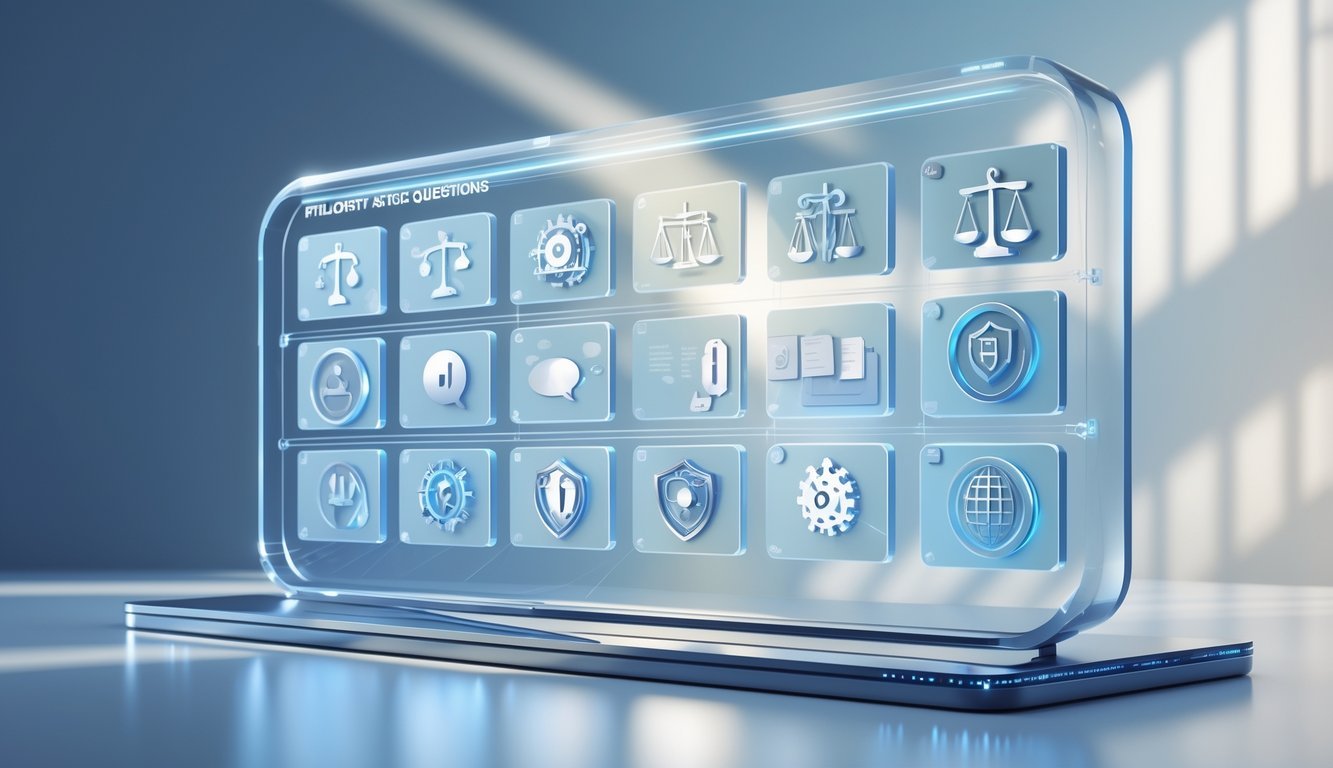The criminal justice system has a tough time managing defendants before trial. Courts usually rely on cash bail and don’t have many options for monitoring. Uptrust Justice Software gives courts a way to track defendants as they wait for trial, without forcing them to sit in jail.

This tech platform helps judges decide who can go home before trial. Uptrust sends text messages and phone calls to remind people about court dates.
The system also links folks to social services if they need help.
Courts everywhere want to lower jail populations but still keep people safe. Uptrust gives court staff and defendants tools that make pretrial supervision easier.
This saves money and lets more people keep their jobs and stay with their families during the legal process.
Key Takeaways
- Uptrust Justice Software lets courts monitor defendants before trial using texts and calls, not jail time
- The platform connects people to social services and cuts costs for courts
- Courts can make smarter release decisions and keep the public safer with better tracking
Core Features of Uptrust Justice Software

Uptrust Justice Software packs four main features that handle daily work for criminal justice agencies. It combines case tracking, messaging, data tools, and security—all in one place.
Case Management Functionality
The case management system tracks defendants from booking until their cases wrap up. Users can see case status, court dates, and what people need to do, all in real time.
The software keeps contact info, legal docs, and case notes in digital files. Staff can add updates as cases move forward.
Key case management features:
- Digital case file storage
- Court date scheduling
- Compliance tracking
- Document management
- Status updates
- Search and filter options
The system sends automatic alerts if someone misses a check-in or court date. Staff can jump in fast if there’s a problem.
Case files link to other parts of the system, like billing and reporting. This setup cuts down on double data entry and keeps info current.
Communication and Notification Tools
The platform includes texting, email, and phone call features for staying in touch. Staff can send reminders, notices, and updates through different channels.
Defendants get automated messages about what’s coming up. They can reply to check-in requests or update their contact info right from their phone.
Communication options:
- SMS text messages
- Email notifications
- Automated phone calls
- Two-way messaging
- Language translation
- Delivery confirmation
The system tracks who got messages and who replied. Staff can see who needs a follow-up.
Custom templates make it easy to send common messages. Agencies can set up standard reminders for court, program signups, or violations.
Reporting and Analytics
The reporting tool creates case summaries, compliance reports, and stats. Users can run reports anytime or set them to go automatically.
Standard reports cover things like caseloads, violations, and program results. The system also builds custom reports based on what you need.
Available report types:
- Caseload statistics
- Compliance rates
- Financial summaries
- Court appearance data
- Program effectiveness
- Staff productivity
Charts and graphs make trends easy to spot. These visuals help agencies figure out what needs work.
You can export reports to Excel, PDF, and more. This makes sharing info with courts or funders a breeze.
Security and Compliance
The software protects sensitive info with encryption. All data transfers and storage meet federal standards for criminal justice.
Admins control who can see or edit certain information. Permissions depend on job roles.
Security features:
- Data encryption
- User authentication
- Access controls
- Audit trails
- Backup systems
- CJIS compliance
The system keeps detailed logs of all user actions. Audit trails show who did what and when.
Regular updates keep the software secure. The platform installs patches and fixes automatically.
Benefits and Implementation of Uptrust Justice Software

Uptrust Justice Software changes how courts work by automating case management, texting, and digital payments. It cuts down on paperwork and helps defendants stay on top of their court dates and requirements.
Enhancing Justice System Efficiency
Uptrust takes care of routine court tasks that used to eat up staff time. Staff don’t have to make as many phone calls or shuffle as much paper.
The software sends out text reminders for court dates and payments without anyone lifting a finger.
Case management gets easier with digital tracking. Courts can see compliance and payment schedules instantly.
Staff get access to everything from one dashboard.
Key efficiency improvements:
- 40-60% less staff time spent on routine tasks
- Automated payment processing and tracking
- Digital case file management
- Fast communication with defendants
The platform fits with court calendars and scheduling systems. Most staff get the hang of it in two or three weeks.
Courts often notice time savings within the first month.
Improving Outcomes for Justice-Involved Individuals
Defendants get text reminders about court and payment deadlines. That helps cut down on missed court dates, since people know what’s expected.
The system sends reminders 48 and 24 hours before court.
Payment plans become easier thanks to digital options. People can pay online or by text.
The software tracks partial payments and updates schedules without extra work.
Outcome improvements:
- 30-50% drop in missed court appearances
- Higher payment compliance
- Better communication between courts and defendants
- Fewer warrants issued
Defendants can check their payment history and balance anytime. They get this info by text or online.
This kind of transparency helps people keep up with their obligations.
Integration with Existing Court Systems
Uptrust connects with most major court case management systems. Integration usually takes four to six weeks, depending on how complex things are.
Support teams help with moving data and testing the system.
The software works with existing payment processors and accounting programs. Financial data moves automatically between Uptrust and court accounting, so there’s no double entry.
Integration features:
- API connections to big court management systems
- Automated data syncing
- Works with existing payment processors
- Little to no disruption to current workflows
Courts keep their regular procedures and just add Uptrust’s features. Staff use familiar systems with some new tools.
The platform adjusts to different court setups and local rules.
Frequently Asked Questions

Uptrust’s justice software sends automated reminders, lets staff handle court scheduling, and makes it easier to communicate with clients. The platform links up with current systems and keeps data secure for legal institutions.
What are the main features of Uptrust’s justice software?
The software sends out automated text and voice reminders for court dates. Both clients and staff get real-time updates on case status.
Uptrust supports multi-language messaging. It comes with calendar sync and appointment scheduling.
The system also includes analytics and reporting tools. Users can check communication history and track case progress.
How does Uptrust’s software aid in reducing failure-to-appear rates in court?
Uptrust sends reminders 72, 24, and 2 hours before court. These messages include case details, location, and what to bring.
Clients can confirm attendance by text. Court staff see updates on responses and can spot no-shows fast.
The software watches for patterns in client engagement. It flags people who might need extra help before court.
Can Uptrust’s platform be integrated with existing case management systems within legal institutions?
Uptrust connects to major case management systems with API integrations. The platform syncs data with court databases and scheduling tools.
IT teams can set up the integration without messing up current workflows. The software works with older systems that courts still use.
Data flows between Uptrust and existing platforms automatically. This cuts out manual data entry and saves time.
What measures does Uptrust take to ensure the security and confidentiality of client data?
The platform uses end-to-end encryption for all data. Uptrust follows SOC 2 Type II and HIPAA privacy standards.
Access controls let admins decide who can see what. The system logs every user action and keeps audit trails.
Data centers have 24/7 monitoring and backups. Uptrust runs regular security checks and tests for weak spots.
How does Uptrust’s software cater to clients with limited access to technology?
The platform works on basic smartphones—no app needed. Clients get messages by text or voice call.
Uptrust offers toll-free numbers for people without unlimited texting. Voice messages come in multiple languages.
Court staff can update communication preferences for each client. The system makes it easy for clients who prefer calls over texts.
What support and training resources does Uptrust provide for new users of its justice software?
Uptrust runs live training sessions for court staff and administrators. New users also get video tutorials and easy-to-follow setup guides.
You can reach their technical support team anytime, either by phone or email. There’s an online knowledge base with FAQs and troubleshooting tips, which comes in handy when you’re stuck.
Each legal institution gets its own dedicated account manager. These managers stick around and help shape the platform to fit your organization’s needs.

